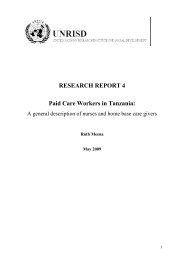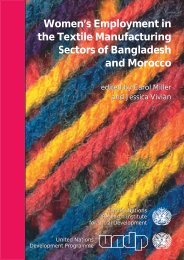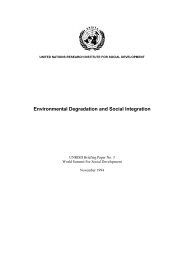Beyond Pragmatism: Appraising UN-Business Partnerships
Beyond Pragmatism: Appraising UN-Business Partnerships
Beyond Pragmatism: Appraising UN-Business Partnerships
You also want an ePaper? Increase the reach of your titles
YUMPU automatically turns print PDFs into web optimized ePapers that Google loves.
<strong>UN</strong>RISD PROGRAMME ON MARKETS, BUSINESS AND REGULATION<br />
PAPER NUMBER 1<br />
The Compact’s relation to the issue of corporate accountability is ambiguous in other respects.<br />
The term figures prominently in the learning process associated with the Compact and in<br />
various institutional and governance reforms (Zadek 2002; Zadek and Radovich 2006). The<br />
notion of corporate accountability à la Global Compact appears, however, somewhat truncated<br />
with attention focused primarily on one particular dimension of accountability, namely<br />
“answerability”, and less on the other crucial dimension, namely, penalties for non-compliance.<br />
Some of the limitations of the Global Compact that were identified early on by civil society<br />
campaigners and others were confirmed by the Compact’s own review process. A wake-up call<br />
was provided by an evaluation carried out by McKinsey and Company in 2004, which found<br />
that only 6 per cent of Global Compact participating companies reported that they were taking<br />
action that would not have happened without participation or that would have been difficult to<br />
implement without participation. A total of 60 per cent of companies stated that Global<br />
Compact participation had not made much difference: 33 per cent said that it had not prompted<br />
any change and 27 per cent said that changes they had taken would have happened with or<br />
without the participation in the Global Compact. The final third (34 per cent) reported that<br />
change would have happened anyway, but that association with the Compact had significantly<br />
facilitated change (McKinsey and Company 2004). These findings appeared to confirm the<br />
concerns of some civil society and other critics that centred on two major problems: first the<br />
scale of free-riding, and second, that best practice learning was either not working or remained<br />
at the level of ideas and awareness, and was not impacting corporate policy and practice in a<br />
meaningful way.<br />
Concerning partnerships more generally, the United Nations General Assembly periodically<br />
considers the topic in its annual deliberations. Initially it called attention to the need for<br />
accountability and balance in terms of the types of countries and enterprises involved (United<br />
Nations General Assembly 2002). These and other guidelines and criteria were ratcheted up in<br />
2004 with the addition of a clause which stressed that “partnerships should be consistent with<br />
national laws, national development strategies and plans, as well as the priorities of countries<br />
where their implementation takes place” (United Nations General Assembly 2004:3). In its 2006<br />
resolution, the General Assembly reiterated these points but also, as mentioned earlier, called<br />
on <strong>UN</strong> organizations and agencies “to share relevant lessons learned”, and on the Secretary-<br />
General “to promote…impact-assessment mechanisms…and facilitate effective learning from<br />
both successes and failures” (United Nations General Assembly 2006:4).<br />
Civil society and academic criticism continued to target the Global Compact. Companies and<br />
business leaders associated with the Global Compact and <strong>UN</strong>–BPs are regularly implicated in<br />
malpractice lawsuits, inquiries and “awards”. Having been, for several years, on the receiving<br />
end of the Corpwatch “greenwash” awards, a new prize for malpractice emerged in 2005 when<br />
a number of NGOs organized the Public Eye on Davos awards. In 2005 and 2006, various<br />
Global Compact companies were either short-listed or won the categories for environmental<br />
malpractice or abusive human rights and labour practices. Several were also implicated in the<br />
Iraq Oil-for-Food corruption inquiry. Some companies involved in <strong>UN</strong>–BPs feature prominently<br />
in cases associated with so-called “foreign direct liability” (Ward 2001), notably those brought<br />
under the Alien Torts Claims Act (ATCA) in the United States. The Save the Children inquiry<br />
into company performance in relation to revenue transparency in the oil and gas industries<br />
revealed the poor performance of several Global Compact companies (Save the Children UK<br />
2005). A recent inquiry into the state of CSR in relation to drug promotion by the<br />
pharmaceutical industry found that many of the problems identified, such as lack of<br />
transparency and provision of verifiable information, unethical marketing, and breaches of<br />
codes and laws, applied in varying degrees to Global Compact companies (Consumers<br />
International 2006). Similar accusations are regularly levelled at Nestlé with regards to the<br />
unethical marketing of breast-milk substitutes (IBFAN 2004). And high profile corporate leaders<br />
have also found themselves in the malpractice spotlight, as in the case of Goran Lindahl, the<br />
former Chief Executive Officer (CEO) of Asea Brown Boveri Ltd. (ABB), who had to step down<br />
as Special Advisor to the Global Compact following accusations that he had been on the<br />
28
















